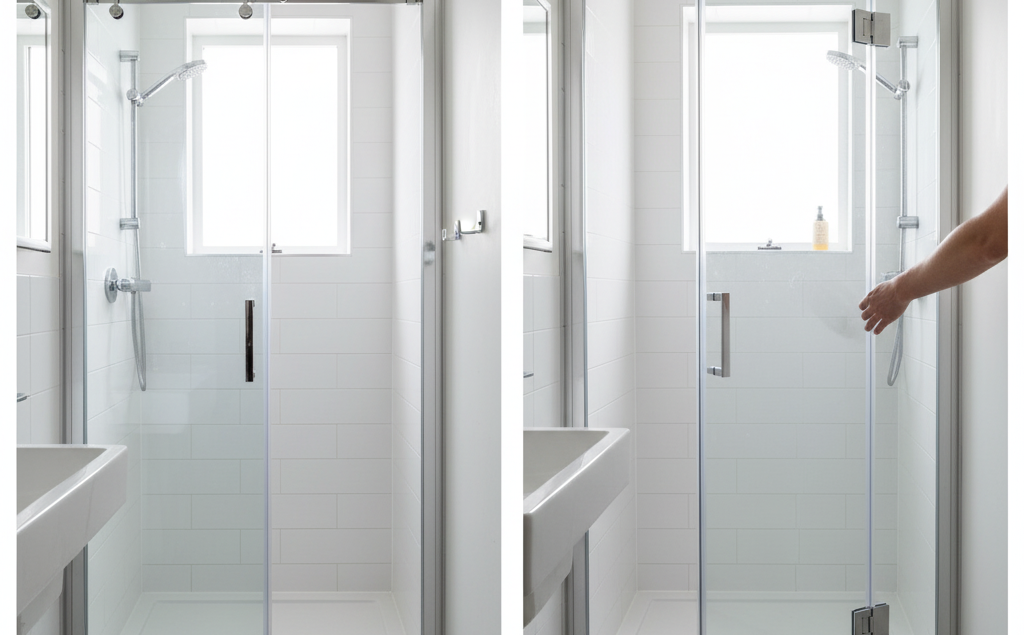Sliding vs Hinged Shower Doors: Which Is Better
Small bathrooms present unique challenges when it comes to design and functionality. Limited space, tight corners, and the need to optimize movement require careful planning, particularly when it comes to shower enclosures. Choosing the right shower door can have a significant impact on both the usability and aesthetics of the space. Two of the most popular options are sliding shower doors and hinged (swing) doors. Each offers distinct advantages and potential drawbacks, and the choice ultimately depends on the specific layout and needs of the bathroom.
This article provides a comprehensive comparison of sliding versus hinged shower doors for small bathrooms, examining factors such as space efficiency, ease of use, installation considerations, maintenance, and design aesthetics. By understanding the differences between these two types of doors, homeowners can make informed decisions and create a functional, visually appealing bathroom.
Space Efficiency
One of the main considerations for small bathrooms is space efficiency. Hinged shower doors require a clear swing path to open fully, which can be a significant drawback in tight bathrooms. This swing area can interfere with nearby fixtures, such as toilets, vanities, or towel racks, limiting flexibility in layout and potentially creating awkward movement patterns.
Sliding shower doors, on the other hand, operate within a fixed track parallel to the shower wall, eliminating the need for a swinging clearance. This makes them ideal for compact spaces, allowing homeowners to maximize floor space while maintaining easy access to the shower. Sliding doors also enable additional storage solutions in small bathrooms, such as wall-mounted shelves or corner caddies, without the risk of obstruction from the door’s movement.
For homeowners seeking high-quality options, sliding shower doors in Berwyn offer a range of designs that combine durability, smooth operation, and modern styling, perfectly suited for small bathroom layouts.
Accessibility and Ease of Use
Accessibility is another critical factor to consider. Hinged doors can be challenging for children, elderly individuals, or anyone with mobility limitations. The door swing requires effort to open and close, and tight spaces can make entry and exit cumbersome. Additionally, if the bathroom is shared or frequently used, swinging doors can disrupt movement in the room when open.
Sliding shower doors provide a more user-friendly solution. The doors glide effortlessly along their tracks, allowing smooth access to the shower without requiring extra space for a swing. Many sliding doors feature soft-glide mechanisms and ergonomic handles, further enhancing accessibility and reducing the risk of accidents or damage to surrounding fixtures.
Design and Aesthetic Considerations
From a design perspective, both sliding and hinged doors offer aesthetic appeal, but their visual impact differs. Hinged doors are often chosen for larger bathrooms where the swing area does not interfere with other fixtures. They can feature frameless or semi-frameless designs and may offer a more traditional or elegant appearance depending on glass thickness, finishes, and hardware options.
Sliding doors, however, are especially well-suited for modern, minimalistic designs in small bathrooms. Frameless or semi-frameless sliding doors create a sleek, open look, while clear glass panels allow natural light to flow throughout the room, making the bathroom feel larger. Textured, frosted, or tinted glass options can provide privacy while maintaining an airy, spacious feel. Sliding doors are versatile in design and work well in a variety of interior styles, from contemporary to classic.
Water Containment and Maintenance
Effective water containment is an essential factor for any shower door. Hinged doors rely on precise alignment and sealing to prevent leaks. In smaller bathrooms, where space constraints may make perfect alignment difficult, even minor gaps can allow water to escape, creating maintenance challenges and increasing the risk of mold or water damage.
Sliding shower doors offer superior water containment due to their track system and integrated water seals. Water is directed back into the shower base, minimizing the chance of leaks. The design also simplifies cleaning, as the smooth glass surface and tracks can be easily maintained with regular wiping. Many modern sliding doors feature coated glass that repels water, further reducing maintenance and keeping the doors looking clear and polished over time.
For homeowners interested in exploring door options, 5 Popular Types of Sliding Shower Doors for Walk-In Showers as Rated by Homeowners provides insight into the most practical and stylish designs currently available, helping to guide informed choices.
Installation Considerations
When choosing between sliding and hinged doors, installation requirements play an important role. Hinged doors require precise clearance to swing fully and may need modifications to accommodate tight spaces or irregular layouts. The installation process can be straightforward in large, level bathrooms but may become complicated when walls are uneven or space is limited.
Sliding doors are often more forgiving during installation, particularly in small bathrooms with tight corners. While tracks must be installed accurately for smooth operation, the doors themselves glide along a fixed path and are less impacted by minor variations in wall alignment. Custom glass solutions can further enhance installation flexibility, allowing doors to fit unique or non-standard openings without compromising performance.
Durability and Longevity
Durability is a critical factor for any bathroom fixture. Hinged doors typically rely on robust hinges and support hardware to handle repeated swinging motion, which can cause wear over time. Heavy use or improper installation may result in sagging or alignment issues.
Sliding shower doors are designed for smooth operation along tracks, with rollers and hardware engineered to withstand frequent use. High-quality materials, such as tempered glass and corrosion-resistant metal finishes, ensure long-lasting performance. Regular cleaning and occasional maintenance of tracks and rollers can extend the door’s lifespan, maintaining both function and appearance for years.
Safety Considerations
Safety is especially important in small bathrooms, where slips and falls are more likely due to limited maneuvering space. Hinged doors can present hazards if they swing outward into tight spaces, potentially hitting nearby fixtures or individuals.
Sliding doors reduce these risks by staying within a fixed track and eliminating outward motion. Tempered glass construction adds another safety layer, shattering into small, non-sharp pieces if broken. Soft-close mechanisms on high-quality sliding doors prevent sudden slamming, further protecting users from injury. For families with children or older adults, sliding doors offer enhanced peace of mind without compromising style or functionality.
Cost and Value
The cost of sliding versus hinged doors varies depending on material, design, and installation requirements. Hinged doors are often slightly less expensive upfront but may require more space and precise installation. Sliding doors can have a higher initial cost, especially for frameless or custom glass designs, but they offer superior space efficiency, long-term durability, and reduced maintenance requirements.
When considering overall value, sliding doors often provide a better return on investment in small bathrooms due to their space-saving design, ease of use, and long-lasting materials. They also enhance home aesthetics and can contribute positively to property value, particularly in compact apartments or urban homes where maximizing usable space is a priority.
Environmental and Energy Considerations
While not always a primary factor, sliding doors can contribute to energy efficiency in bathrooms. By sealing the shower area effectively, they help retain heat within the enclosure, reducing energy loss from ventilation systems. This makes showers more comfortable during colder months and can minimize heating requirements.
In addition, the use of durable materials such as tempered glass and corrosion-resistant metals means that sliding doors require fewer replacements over time, reducing waste and supporting environmentally conscious bathroom renovations.
Customization and Versatility
Sliding shower doors offer a high degree of customization, making them adaptable to a wide variety of small bathroom layouts. Glass thickness, frame style, finishes, and hardware can all be selected to complement existing bathroom design. Custom glass solutions can accommodate unusual shower dimensions, sloped ceilings, or uneven walls, ensuring a perfect fit and seamless functionality.
Homeowners can also choose between fully frameless, semi-frameless, or framed sliding doors depending on design preference, budget, and maintenance considerations. This versatility allows sliding doors to meet both functional and aesthetic needs, making them an ideal solution for compact bathroom spaces.
Frequently Asked Questions (FAQs)
Can sliding shower doors be installed in very small bathrooms?
Yes, sliding doors are ideal for small bathrooms because they do not require additional clearance for swinging.
How difficult is it to clean sliding doors compared to hinged doors?
Sliding doors are generally easier to maintain, especially if they have coated glass and accessible tracks for wiping down.
Are sliding doors more expensive than hinged doors?
Sliding doors may have higher upfront costs due to hardware and glass quality, but they provide better long-term value in small spaces.
Can sliding doors be used with walk-in showers?
Absolutely. Sliding doors work well with walk-in shower designs and can be customized for unique layouts.
Do sliding doors require professional installation?
Professional installation is recommended, particularly for custom or frameless sliding doors, to ensure precise fit, smooth operation, and long-term durability.
Conclusion
For small bathrooms, sliding shower doors offer clear advantages over hinged doors. They maximize usable space, improve accessibility, enhance aesthetics, and provide superior water containment and durability. While hinged doors can be suitable for larger bathrooms, sliding doors are the preferred choice when space is at a premium.
For homeowners looking for high-quality, custom solutions, Berwyn Glass provides custom glass solutions in Berwyn, offering expertly designed sliding shower doors that combine functionality, style, and durability to make even the smallest bathrooms feel open, modern, and efficient.

